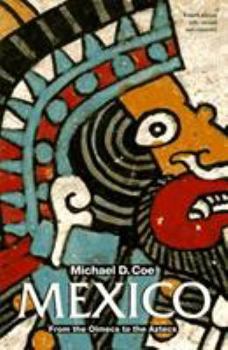Mexico: From the Olmecs to the Aztecs
(Part of the Ancient Peoples and Places Series)
Select Format
Select Condition 
Book Overview
Mexico arrives in its eighth edition with a new look and the most recent discoveries. This is the story of the pre-Spanish people of Mexico, who, with their neighbors the Maya, formed some of the most... This description may be from another edition of this product.
Format:Paperback
Language:English
ISBN:0500277222
ISBN13:9780500277225
Release Date:February 1994
Publisher:Thames & Hudson
Length:215 Pages
Weight:1.30 lbs.
Dimensions:0.6" x 6.3" x 9.5"
Customer Reviews
4 ratings
Excellent book
Published by Avid reader , 5 years ago
This is a very excellent book. Its simple, easy to understand, has colorful pictures and nice maps.
Review on Coe's "Mexico: From the Olmecs to the Aztecs"
Published by Thriftbooks.com User , 15 years ago
Michael Coe's "Mexico: From the Olmecs to the Aztecs" is a great edition to the growing body of work on Ancient Mexico. It is a well written and logical analysis on the civilizations of Mexico. I have used this book several times to help solidify arguments in various research papers. I would highly recommend this work for anyone interested in the ancient world of Mexico.
Must have book on Mexican Archeology
Published by Thriftbooks.com User , 17 years ago
This is a simple and easy to use reference to the archeological history of Mexico. Simply laid out with lots of examples. Good book.
We did not call ourselves 'Mesoamericans". Nevertheless...
Published by Thriftbooks.com User , 22 years ago
This book makes it clear that the vast majority of the history of "Mexico and Central America" has nothing to do with Europeans or anything "Latin American."Many readers may be surprised (but really it's just common sense) to learn that we Indigenous people of "Mexican" descent do not call ourselves "Mesoamericans," a term coined by a white Westerner, Paul Kirchoff, as this book makes clear.Nevertheless, this book is the best general history of "Mexico" (itself another Euro-Iberian/American creation, twice over: 1821 and 1848).This truly is a "pioneering synthesis" in that it takes the reader along a journey of one of the world's richest and truly original civilizations. Even more impressive when compared to the achievements of Europe: despite a 3 1/2 millenium lag time in agriculture, the peoples of Anahuac nevertheless constructed a monumental and highly sophisticated civilization, rivalling (and often dwarfing) those of Christendom at the same time.**Compare Western Europe in the Neolithic Age to Mexico in it's own "Neolithic Age": the disparity of achievement is truly embarrassing to anyone holding onto notions of "European cultural superiority." Yikes, what a difference!Don't take my word on it, read the Spaniards' own first-hand accounts on it!Considering the lack of metallurgy in the land until after 800 AD, it is truly astonishing to behold the prolific construction of massive temple-pyramids and sophisticated cities across Anahuac.Our people called the land Anáhuac (accent placed on purpose), meaning "the land between the waters" in the still-pervasive Nahuatl language. Just as there is something historically known as "Christendom" or "Western Civilization"(oddly enough, both are based upon non-Western achievements in Sumeria and Egypt!),even more so is there the historical justification for the term "Anahuac Civilization" (built upon the home-grown achievements of Mexico, and not outsiders as in the case of Europe/Christendom).** This last statement is probably the most important thing that the reader will come away with from Professor Coe's book.As the reader of both of the recent editions of "Mexico" and "The Maya" will also learn, there was a unitary and common cultural matrix which connected and sustained all the cultures of "Mexico" and "Central America" down to Costa Rica. The divisions were far more political than cultural, just as in "Christendom" or the the modern European world.(At the time of the Spanish Invasion, Nahuatl was spoken almost everywhere, just as many modern Europeans often speak English in addition to their own languages.)The so-called "U.S. Southwest" must necessarily be includied in this epic unfolding of civilization, as is made abundantly clear in Coe's 5th edition.Present-day political borders and archeolgical abstractions of our presnt time get in the way of understanding this dramatic story. Post-European Invasion divisions are not the way to understand this history, just as British imperial definitions d






